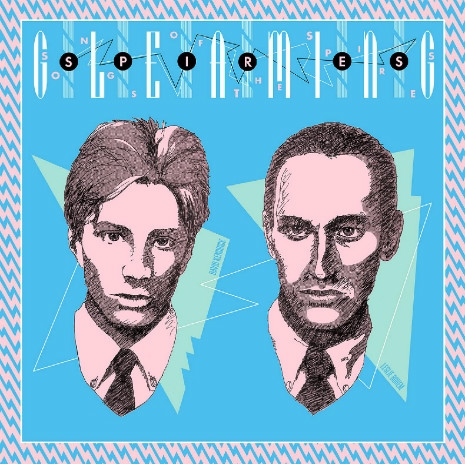
As much as the mainstream clamors for something truly unique and edgy, the minute they get it is the minute that they typically do not want it. It’s this cultural miasma where cult artists are born and a perfect example of this is the early 1980’s band, Gleaming Spires. The seeds of the Spires were first planted in a Los Angeles new wave rock band called Bates Motel, but it took the fertile ground of joining Sparks in 1981 to help sprout one of the better—albeit obscure—cult bands to have emerged out of the post-punk musical landscape.
While they were together for only handful of years, ending with 1985’s Welcoming a New Ice Age, new label Futurismo have been working with the two brilliant minds behind Gleaming Spires, vocalist and bassist Les Bohem and drummer David Kendrick on a re-release and remastering of their first album originally released on the legendary Posh Boy label, Songs of the Spires. Available as both a digital download, as well as 180 gram vinyl album (colored either lemon meringue or blue movie, depending on your preference), Songs of the Spires has never looked or sounded this good. It’s a pitch-perfect debut album with that mix of quirky humor, emotional angst and sonic layers that could have only come from the dynamic duo of Bohem and Kendrick.
So in honor of this release, here is an exclusive interview with the Spires themselves, the first since their final album in 1985.
What was the big inspiration early on to get into music? Was it anything encouraged or discouraged by your family?
Les Bohem: Well, I took guitar lessons when I was a kid – my mom’s family was deep into Pete Seeger and I saw him at a Unitarian church when I was maybe seven. I had a subscription to Sing Out and an older cousin who was very cool and knew about Bob Dylan. In fact, I can remember that we thought it was lame that Peter, Paul and Mary covered “Blowin In the Wind.” My first performance was said “Wind” at my grammar school graduation. Aldous Huxley was in the audience. He told my Mom I had a nice voice. This either means he was old and deaf, not paying attention, or was on Psilocybin.
The Beatles during my first year of Junior High and that was it. The Kinks, Them, the Stones, the Who – We did “Substitute” in my first band at the 8th grade talent show – American lyrics ‘cause we didn’t know any better. Then my folkie roots began to show and I wore striped T-shirts and a vest and glasses, which I didn’t need, so I could look like the Lovin’ Spoonful.
My mom was always forgiving and she tried hard to like what I was doing. My dad never really got it. I broke his heart a bit when I left college to become a rock star. Having both worked as writers in the movie business, they had a healthy suspicion of any career in the arts.
David Kendrick: Both of us had artistic families. My father was a sculptor. I won’t say I was “forced into music” but was definitely encouraged. I mean, I had a very loud drum set in my bedroom. I was in bands outside of school.
How did you two meet? What events led to the formation of Bates Motel?
Les Bohem: I formed Bates Motel with Bob Haag and Alan Slater somewhere around 77-78, and we added Bob Beland somewhere right after that. We had a drummer who was a friend of Alan and Bob Haag’s. He left to join another band and then Bob Beland left. We were playing around L.A. and I don’t remember how we put the word out for drummers. I feel like I’d met David once at the Troubadour before that. He wore funny shoes. He was the first really good drummer and still far and away the best that I have ever played with. I remember how good the songs sounded the first time we practiced with him. Alan was gone by now, by the way, since he formed another band, and we had added another guitar player, Dave “the Rave” Draves. He and Bob Haag were from Lancaster, a town about 60 miles into the desert from L.A. We practiced there in a studio space that was in an arcade, which had been owned by Judy Garland’s father. On the long drives up and back, David and I become friends quickly. We’d bring tapes of favorite songs. We’d talk about books, music. We were still young. We’d get heavy.
David Kendrick: Bates already existed. I joined after they fell for my lamppost drummer propaganda. I liked the film reference name too
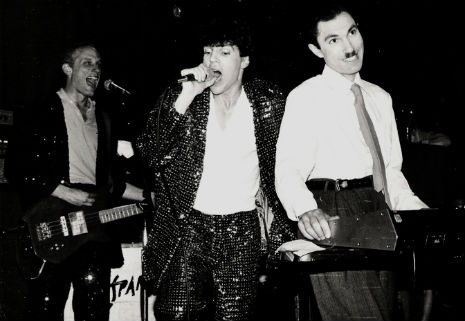
It’s been written that the Mael Brothers discovered you after becoming familiar with Bates Motel. Where you fans of Sparks beforehand?
Les Bohem: It all begins with a screenwriter named Bill Kerby. I liked their album covers but had only heard a few songs. David, I believe, was the bigger fan. In those days, there was no place to get espresso in Los Angeles and the thing that David and I really bonded over was espresso. I had been going to the Belgian Waffle stand at the Farmer’s Market on Fairfax for years to have coffee with Bill, a writer who I’d met through my friend Miranda when they were dating. So this actually all begins with Miranda. Anyways, I would meet Bill for coffee mornings. Then, in the Bates days, a whole bunch of us would go in the afternoons and we would see Ron and Russell, who hung out there most afternoons. It was a celebrity sighting. “Look, it’s those guys from Sparks.” After a while, we developed one of those nodding relationships. One day, I went over to their table. We were trying everything to get signed and I thought that maybe they’d produce us. I said, “You guys are supposed to be the fathers of New Wave, how about you come see your kids,” or something equally lame and gave them a flyer to a show we were doing at Blackies, a club in Santa Monica. They came. They did not want to produce us. They asked us to be their band.
David Kendrick: I knew of and loved Sparks. Before I moved to L.A. In 1977, I tried to force a cover band in Chicago to try “Here in Heaven” to no avail. I saw sparks live with an English group too.
We owe our Bates/Sparks connection to the only non-restaurant espresso bar in Los Angeles in 1980, where we both separately, then together hung out. Originally the talk was more about film. Ron and Russell saw us play live and wanted a band again after the Moroder days
Bates Motel was sonically more rooted in a melodic rock/new wave sound, as evidenced by the song “Live Among the Dancers” off of the Sharp Cuts compilation. How would you describe the evolution from Bates Motel to Gleaming Spires?
Les Bohem: Well, Dancers was written by Bob Haag, but the songs that I wrote and that I wrote with Bob were a bit more out of that world. At the time, I had a foot in each camp. I saw the first David Johansen solo show at the Whiskey and wanted to be him until I saw the first Elvis Costello Whisky show, or bought Some Girls. And then there were those Bowie albums. When David and I started writing together, the songs were more hard edged, pop, but written for a rock band. By the third Spires album, when we’d been playing as a band for a couple of years, some of that comes back on “Things I’ve Done to Our Love,” “Mercy,” etc. When we did the first album, I’d been fooling around on piano for the first time and David had given me some lyrics. I had some new songs that weren’t “Batesable,” and David and I wrote a bit together. We knew Stephen Hague and he had a studio in his garage and he was and is a fucking genius. I went over to demo some of the songs. It sounded amazing. David came along. We did more. It kept sounding amazing. Those demos are the first album.
David Kendrick: Every band that supported Bates Motel in town got a record deal the night they opened for us it seemed! So we felt maybe something wasn’t exactly right…
Here’s your classic, cheesy music-interview question: Where did the name Gleaming Spires come from?
Les Bohem: I don’t remember. I would have to say out of David’s twisted head but ask him.
David Kendrick: A term of architectural endearment.
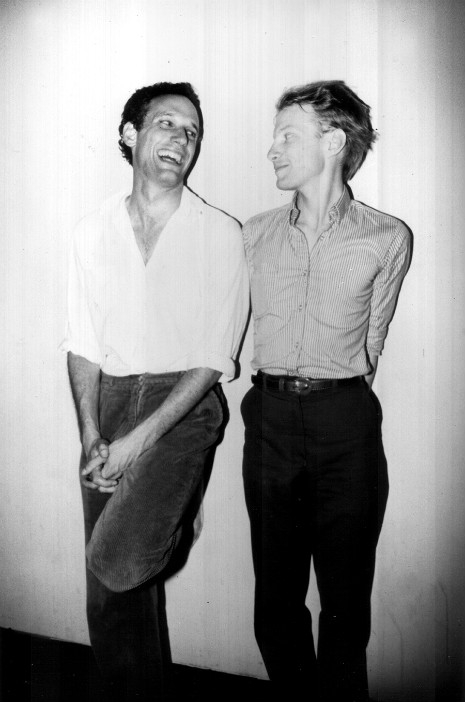
Songs of the Spires is an incredibly strong debut album and to this day, sounds like nothing else. There’s a sense of angst and borderline melancholy that permeates much of the album. What was your creative head space going into that record?
Les Bohem: Angst and way past borderline melancholy. And thanks for noticing. Few have.
David Kendrick: Thanks for that. For Les and I both, if I may, Spires was all about the song and not trying to wedge it into a specific band context. This was done a bit during Bates Motel time, in other words, if a song needed bagpipes, we’d get bagpipes and worry about playing it later or not playing it live at all. Plus, Les and I shared a similar blend of “well this world makes you either cry or laugh, so maybe there could be both in some songs.” To this day, that combo makes a lot of people queasy. If there is humor in a song, to them it’s all the way Weird Al territory. Not so.
There were two music videos made for Songs of the Spires, including clips for both “Are You Ready for the Sex Girls?” and “How to Get Girls Through Hypnotism.” Both videos, directed by Doug Brown, have a great, non-commercial look and approach. How much input did you have in the direction of either clip?
Les Bohem: Doug had a studio where he shot cooking videos, I think, and David made a great lemon meringue pie. The decision was clear. We had to do the Mother as well as the Whore.
David Kendrick: We were both film noir buffs, which I think shows in “Hypnotism” and hey, I liked making pies. Since we had an Edgar Ulmer or less level budget, we needed inventive film guys. Doug directed and set up all the shots after we conceptualized the ideas. We were always about appropriation and looking at the world from a place of amazement and discomfort. Sex was always kind of a terrifying enterprise. We liked scene setting and with time distance I’m kind of interested in how cinematic, like “The End of All Good Things” What could possibly be depressing about such a song title?
Also, and it almost goes without saying, one could easily make the worst contrived, hackneyed, sexist, insulting, exploitative and ridiculous video in the world to “Sex Girls,” so why not leave sex and girls out altogether. Some people got it I hope.
Did either video get much airplay?
Les Bohem: You’ve got to be kidding! They get more now on YouTube. But I do think the “Sex Girls” won some award, so someone saw it.
David Kendrick: Not regular MTV, but other video shows and, oddly, in certain gay video bars we were a hit. Well, maybe not so oddly, with us dressed in matching clothing and shaving Les’ head. My girlfriend at the time, now wife, frequently rolled her eyes at our seemingly gay appearance, but I think we were kind of clueless. I actually liked button down shirts and ties in rock context!
One of the things I love about Gleaming Spires is this experimental spirit that lent itself to so many of your songs. For example, the weird talking bits in both “How to Get Girls Through Hypnotism” and later on with “At Together.” What was the creative impetus behind this?
Les Bohem: Thanks. A lot of it was Stephen. He could really take things out. I listened to “At Together” recently and I couldn’t believe how good the sounds were. It was in the air, the spirit of the times and as I said, I grew up on records that did weird stuff. I’ve actually listened to “Revolution Number 9” all the way through more than once.
Your music has appeared both in Revenge of the Nerds and The Dark Brothers’ Devil in Miss Jones 3 & 4. Where you guys approached by someone involved in film production or was it more of a friend of a friend kind of thing?
Les Bohem: Don’t forget The Last American Virgin, and School Spirit, in which we appear as well. Or The Horror Show, which, God help me, I wrote. It’s different in every case. I’d started writing and my agent knew people, and “Sex Girls” was on the radio a lot in L.A. As to Miss Jones, David’s well known condom collection might hold the answer.
David Kendrick: We got a lot of mileage from teen comedies, even appearing as ourselves in School Spirit in 1985. We played, uhm, a band. For Devil in Miss Jones 3 & 4, I knew the director Greg Dark. He was a kind of a New York Abel Ferrara kind of guy, who I later wrote some horror film treatments (which were never made) for. He wanted extreme so I scored extreme!
You followed Songs of the Spires with the equally great Walk on Well Lighted Streets two years later. One of the strongest tracks on this album is the brilliant “A Christian Girl’s Problems.” What was the story behind this song?
David Kendrick: Les has the book that was written by a crazy man who must have had serious, serious sex problems that he tried to pass onto others via “teen help” books!
Les Bohem: It’s from a book from the 1930s, which I believe advises young women that if they feel a chafing which causes undo excitement, there is a simple surgery that can help.
Speaking of “A Christian Girl’s Problems,” the music video made for the song makes the unusual choice of having a Roman Gladiator-type theme. Was there a specific reason for this?
Les Bohem: I blame drugs.
David Kendrick: The Martin Brothers (The Go-Gos, Sparks etc) who directed had two ideas that we glommed into one. For some reason we thought about a film of us on a chariot or running in costume throughout Los Angeles, but it was not to be. The self help book was called A Christian Girls Problems, so maybe we felt the Christian problems began in Roman days.
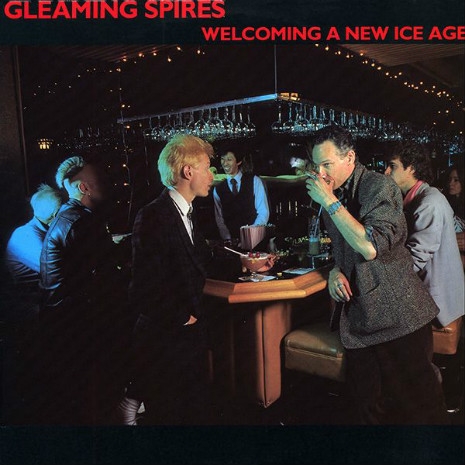
1985’s Welcoming a New Ice Age ended up being your final album. The title track, as well as the aforementioned “At Together,” have this unique mix of catchiness and emotional weightiness that mercifully never dips into the cloying. All of this makes it the perfect bookend with the first album. Did you realize it would be your last album going into the recording process?
David Kendrick: It wasn’t consciously a “final” LP although. For me the end really came when Bob, our guitarist, disappeared days before our first full, United States tour without any word. We still have some unused tour t-shirts somewhere.
We had a different producer, Greg Penny, and a reasonable amount of studio time though not being able to play the songs still rankles a bit.
Les Bohem: We didn’t know. I don’t even remembering breaking up.
With the last album working with Sparks being 1986’s Music You Can Dance To, only a year after Welcoming a New Ice Age, how was the adjustment factor in post-Sparks & post-Spires life? Was the split from Sparks due to a creative shift for the Mael Brothers?
Les Bohem: Rift – not at all. I didn’t play much, or at all, on that album. Ron did most of the bass parts on his trusty Roland. I had started screenwriting by then, and was in New York a lot, working on a script for Al Pacino. I thought I was hot shit, or I thought it was time to grow up. I called Russell to quit and I think he was relieved. They were having to pay for my flights back and forth etc. I stayed in New York for six weeks, finished the script and turned it in. I was fired immediately. I came back to L.A. and went to see Sparks, still with David, at the Palace. Their new bass player was better than me, younger than me, skinnier than me and he had that really good Flock of Seagulls hair that I would never have. It was time for me to reconsider my options.
David Kendrick: I played with them until they stopped playing live in the 80’s and for many years there after. They worked from then on mostly as a duo with an engineer. DEVO happened for me quite soon thereafter as well, and it was a very full time group back then.
I still see the Mael Brothers and admire their newest work. I was fortunate that Russell agreed to be a criminal protagonist singer for my record, called Crime Memory and Loss, by my current project, The Empire of Fun. It will come out in 2015 with many cool singers.
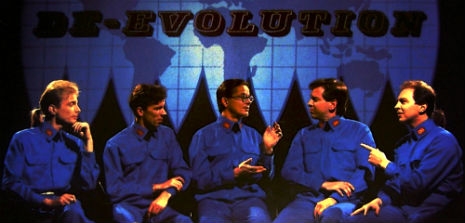
David, you have continued to work in music, including playing with such great artists like DEVO and Andy Prieboy. Did your work with Gleaming Spires color your future musical work?
Les Bohem: It fucking better have, David!
David Kendrick: Spires convinced me you could just try to write the best songs you could without trying to write in to a band style. So the idea of being able to have many different vocal narrators and song subject ideas work successfully under was from Gleaming Spires. Plus Spires success happened almost in spite of us!
Les, after the breakup of Gleaming Spires and leaving Sparks, your creative career turned to film, with an emphasis on screenwriting in particular. Given that your father, Endre, was a noted screenwriter himself, was this a path you had considered taking before becoming a musician?
Les Bohem: I’d written two or three scripts while I was playing in bands. My father and mother were both writers, but long out of the business. My mother hated it, went back to school and became a special collections librarian and a rare book dealer. My father was retired and working on a novel. What I’m saying is that nepotism did me no good, but that my idea of what grown ups did when they went to work was to go in the other room and type. I had a friend, Stuart Cornfeld, who’d been the drummer in a band I’d had for a little while in college. He had gone onto to produce The Elephant Man and The Fly for Mel Brooks. We’d tried once to write something together. He called me while I was in Paris with Sparks and said that there was a company who wanted to do a movie about rock & roll and that he’d told them they should talk to me, as I was in a band and spoke in complete sentences. They flew me back from Paris. My head was still shaved from the “How to Get Girls With Hypnotism” video. I told them their idea sucked and they hired me in the room. For the next few years, I got jobs writing about rock and roll. I was cheap, the junior execs thought I was cool and the movies were never made. Their bosses sensibly saw that there was no part for Kevin Costner in a rock & roll script.
So, no, I never considered any path. I just wanted to be a Beatle, and then maybe Bowie or Bruce Springsteen or Ray Davies….and then once in a while Hemingway or Fitzgerald or Paul Bowles. Then one day I looked up and there I was, in a room by myself, writing movies.
What projects are you currently working on?
Les Bohem: I’m hopefully doing a show for Hulu based on a pilot I wrote about storefront psychics. It will feature many of David’s songs.
David Kendrick: My long running studio project is The Empire of Fun, which records many so called “concept projects.” I also work with Andy Prieboy and make long running punk rock hoedown music with Glen Meadmore, plus many many oddities that come my way. I still love live performance.
Les, are you ever tempted to return to music?
Les Bohem: God, yes. I did an album last year with my friend, Marvin Etzioni. Honestly, I still think of myself much more as a guy from a band than as a screenwriter. I’m more comfortable with musicians than with the denizens of my day job.
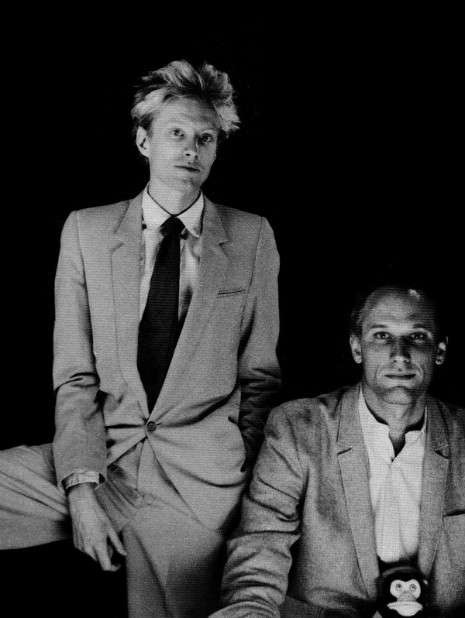
How do you reflect on your time in Gleaming Spires? Is it more of an old friend or a strange ghost?
Les Bohem: Well, both. It’s nice to listen to the albums free of the baggage of wondering if someone will sign us, or buy our record. I love the records, except for occasional moments where I wish I was a better singer. Roseanne Cash calls her songs “postcards from the future,” and I can’t believe how apt that is. I hear lyrics of mine or David’s and I can’t believe that we knew that that was going to happen to us. And then, of course, “Sex Girls” has given me a certain cred with my son and his friends.
David Kendrick: We always said Spires songs were about being homesick in your own home, so whatever displacement existed still exists!
Last but not least: Are your pie and coffee making skills still up to snuff?
Les Bohem: David was always the pie guy and makes a mean “e’. I like to go out for coffee these days. I take a notebook, so I guess I still haven’t gotten over that Hemingway thing.
David Kendrick: Hey, my pie making is still legendary. You must try my real pumpkin sweet potato pie! Thankfully the world, in a small way, IS actually a better place now owing to the amount of excellent coffee and espresso machines now in existence!
Huge thanks to Delaney at Futurismo for setting up the interview and especially big thanks to David Kendrick and Les Bohem for taking the time to answer my questions. You can purchase Songs of the Spires over at Futurismo’s website.